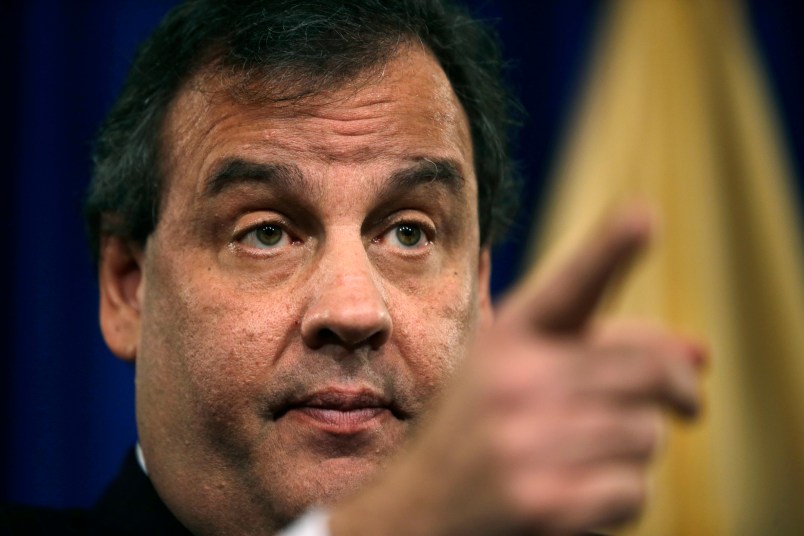As I noted below and as reality has noted several times in recent months, a series of self-inflicted wounds and news events over which he had little control have conspired together to make the idea of a Chris Christie presidential run an almost comically unrealistic proposition. But let’s not forget that the idea was always close to preposterous. And it’s worth asking why the idea ever had much currency in the first place.
Christie comes from a pretty blue state. He is characterologically very much a product of the tri-state area, where a very brash and aggressive personal style is de rigueur, especially for Republican politicians. By national standards he is only just on the cusp of RINO status. To many, indeed, he’s the ultimate RINO.
It’s true that one could say some of these things about Mitt Romney, though that isn’t exactly a major selling point after the 2012 election. But Christie is quite simply a creature of New Jersey and tri-state politics who both by his manner and his policies would be a tough sell – certainly a tough primary campaign sell – in the red states where presidential candidates are chosen. Add to this that the reason he became extremely popular in New Jersey for a while – Hurricane Sandy – is also what basically sank him in national Republican politics – because of his literal and figurative embrace of President Obama.
But the real issue here, I think, is the extremely distorting lens of the New York media world and the very particular breed of people who make up tri-state Republicanism, particularly how the two interweave with each other. Media-prominent, big time New York and New Jersey Republicans tend to be very well-off and very conservative. But they are usually not terribly focused on the evangelicalism-tinged social issues that drive Republican party identification in its heartlands. They also have very little experience getting Republicans elected where they live. It happens certainly. The GOP dominated the New York mayoralty for a generation – though in an increasingly nominal way under Mike Bloomberg.
What these Republicans prize is law and order politics and politicians who can stand up to and knock around the entrenched Democrats and liberal political norms they see all around them. When I say law and order, I mean not just tough policing and long jail terms but the general no nonsense, not putting up with pussy-footing and complaining and indulgent labor contracts and all the rest. That applies to law and order and cracking down on the thugs, teachers unions and Islamofascist bad guys abroad – all of whom they tend to see in a somewhat similar light. They are much more anti-liberal – in the sense of big city urban liberal politics writ large – than conservative, per se. And this all explains why Rudy Giuliani – dubbed “America’s Mayor” by a handful of media yakkers and Republican backers in New York City – was the ultimate avatar of this particular tri-state, not-gonna-take-any-more-BS breed of Republicanism.
And how did he do when he ran for President? Of course, he comically crashed and burned and barely made it to the first primary. Not that he wasn’t popular in a way with national Republicans – but as a general symbol of butt-kicking and a conservative – of a sort – who could clean up New York City. He was very popular. And so was Christie as the guy who ended up in viral videos yelling at whiny teachers or other liberal complainers. That behavior applies to something deep in the base conservative Id. But it’s not enough to actually garner sustained electoral support, which inevitably comes back to policies. With Rudy, when it came to actually making the grade as a conservative in a GOP primary, he couldn’t even get off the ground.
Again, I don’t really think this was because Rudy did anything wrong in his campaign. His campaign just wasn’t realistic in the first place. The reason it seemed like it might be plausible was the distorting effect of New York’s dominance of the media. And not just the ‘liberal’ media but conservative media too.
Remember, Fox is based out of New York City. Limbaugh originally broadcast out of New York City when he first went national and the show’s staff is still based there. The New York Post, which is a major driver of national media coverage, is in New York City. The National Review is based in New York City. And let’s not forget that a huge, huge amount of the money that drives Republican politics (similar but not quite the same with Dems) comes out of New York City.
It’s just not where the voters come from.
That creates a distorting lens which gave us the failed Rudy candidacy and it’s a big part of what created the illusion that Chris Christie was ever a viable presidential candidate. Even in his heyday, he never would have survived first contact with Iowa, South Carolina or most of the Republican heartlands. It was never, ever going to happen.






